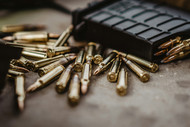Understanding Ammunition: A Beginner’s Guide for UK Gun Owners
Posted by G-TEN on 11th Jul 2024
Choosing the right ammunition is essential for any firearm owner, whether you’re a beginner or an experienced shooter. The type of ammunition you use can significantly impact your shooting experience, from accuracy and performance to safety and legality. This guide will explain the different types of ammunition, their uses, and how to choose the right ammo for your firearm, with a specific focus on UK regulations and considerations.
Types of Ammunition
Ammunition comes in various forms, each designed for specific purposes and types of firearms. Here are the main categories:
1. Rimfire Ammunition
- Characteristics: Rimfire ammunition has a primer located in the rim of the cartridge. When struck by the firing pin, the rim ignites the primer.
- Common Calibers: .22 Long Rifle (LR), .17 HMR.
- Uses: Ideal for target shooting, plinking, and small game hunting. It's popular for its low cost and minimal recoil, making it suitable for beginners.
2. Centerfire Ammunition
- Characteristics: Centerfire cartridges have a primer located in the center of the base. They are generally more powerful and versatile than rimfire cartridges.
- Common Calibers: 9mm, .45 ACP, .223 Remington, .308 Winchester.
- Uses: Hunting and competitive shooting. Centerfire ammunition is preferred for its reliability and availability in a wide range of calibers.
3. Shotgun Shells
- Characteristics: Shotgun shells are cylindrical and contain multiple pellets (shot), a single slug, or other projectiles. They come in different gauges, with 12 gauge being the most common.
- Common Types: Birdshot, buckshot, slugs.
- Uses: Shotguns are versatile firearms used for hunting birds and small game and clay shooting. The type of shell determines its specific use.
Understanding Ammunition Components
Each cartridge consists of several components that affect its performance:
- Bullet: The projectile that is fired from the firearm.
- Case: The container that holds all the components together.
- Powder: The propellant that ignites and creates pressure to fire the bullet.
- Primer: The ignition source for the powder.
How to Choose the Right Ammunition
Selecting the appropriate ammunition for your firearm involves considering several factors:
1. Firearm Type and Caliber
Ensure the ammunition matches the caliber and specifications of your firearm. Using the wrong caliber can be dangerous and damage your gun.
- Check the Markings: The caliber is usually marked on the barrel or slide of the firearm.
- Refer to the Manual: Your firearm's manual will provide recommended ammunition types.
2. Purpose
Consider the primary use of your firearm:
- Target Shooting: For practice and target shooting, choose affordable and readily available ammo like .22 LR for rimfire rifles or 9mm for handguns.
- Hunting: Select ammunition designed for the game you're hunting. For example, .308 Winchester is popular for deer hunting, while .22 LR is suitable for small game.
3. Bullet Type
Different bullet types serve different purposes:
- Full Metal Jacket (FMJ): Ideal for target practice due to its affordability and consistent performance. FMJs penetrate well but do not expand upon impact.
- Hollow Point (HP): Hollow points expand upon impact, causing more damage and reducing the risk of over-penetration.
- Soft Point (SP): Used for hunting, soft points offer a balance between penetration and expansion, making them effective for medium to large game.
4. UK Legal Considerations
Be aware of UK laws and regulations regarding ammunition:
- Firearms Act 1968: The primary legislation regulating firearms in the UK. Ensure compliance with all requirements.
- Certificate Requirements: You must have the appropriate firearm or shotgun certificate to purchase and possess ammunition. Ensure your certificates are up to date.
- Storage: Ammunition must be stored securely, ideally in a separate, locked container from your firearms.
- Quantity Limits: Be aware of any restrictions on the quantity of ammunition you can purchase and possess.
Storing and Handling Ammunition
Proper storage and handling of ammunition are crucial for safety and longevity:
- Cool, Dry Place: Store ammunition in a cool, dry place to prevent moisture damage.
- Secure Storage: Keep ammunition in a locked container away from children and unauthorised users.
- Check Expiry: Regularly check your ammunition for signs of corrosion or damage, and replace any compromised rounds.
Additional Tips for UK Gun Owners
- Join a Club: Many shooting clubs in the UK offer training and advice on ammunition selection and usage.
- Seek Professional Advice: Consult with certified instructors or experienced shooters for personalised recommendations.
- Stay Informed: Keep up to date with any changes in UK firearms laws and regulations to ensure compliance.
Conclusion
Understanding ammunition is fundamental for any firearm owner. By familiarising yourself with the different types of ammunition, their uses, and how to choose the right ammo for your firearm, you can enhance your shooting experience and ensure safety. Always prioritise matching the ammunition to your firearm, considering your specific needs, and adhering to UK regulations. Happy shooting!

